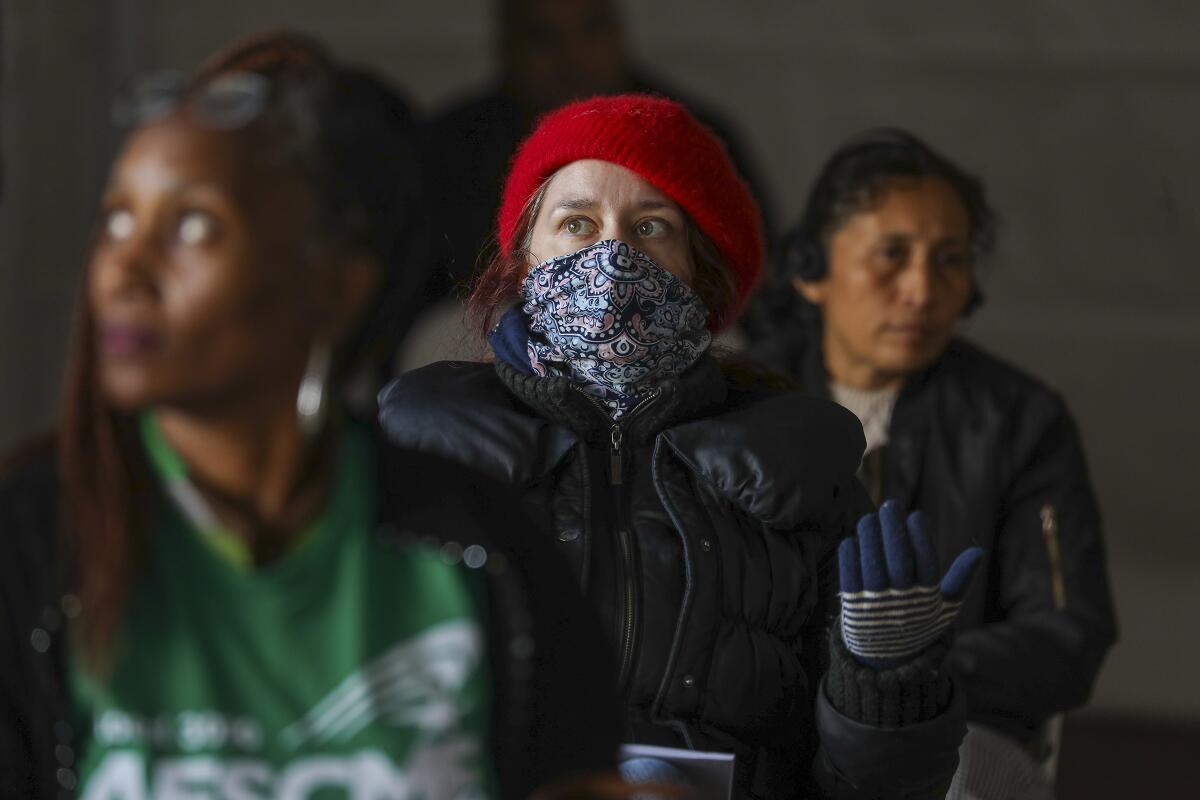With coronavirus spreading, L.A. moves to ban evictions, add protections for homeowners

- Share via
Renters and homeowners are likely to see significant new protections against evictions and foreclosures after the Los Angeles City Council on Tuesday approved emergency measures to mitigate the economic effects of the novel coronavirus.
At the same time, advocacy groups criticized Gov. Gavin Newsom for not doing more to prevent Californians from losing their homes during the pandemic.
L.A.’s plan will temporarily ban evictions and late fees, require landlords and residential mortgage-holders to work out payment plans with affected residents, reduce city business taxes and create a citywide rental assistance fund. The measures will not take effect immediately. Instead, the council’s vote directs the city attorney to draw up an emergency eviction plan, which could be finalized as soon as next Tuesday.
In doing so, the city would be taking advantage of the broad constitutional powers that legal experts agree governments have to halt evictions during emergencies.
“The moment that we are in is one that takes a population of millions of people in Los Angeles who live day-to-day on the edge and throws them into extreme economic danger and distress,” said Councilman Mike Bonin, whose district includes many Westside beach neighborhooods. “I’m praying there will be a national comprehensive response to this, or a state one. But in the meantime, we just got to go because the pain is going to be extreme.”
Some eviction protections for residents affected by the coronavirus are already in place, created through an executive order Mayor Eric Garcetti issued on Sunday.
Also Tuesday, Los Angeles County officials announced a moratorium on all no-fault residential and commercial evictions, starting retroactively on March 4 and lasting until May 31. Tenants will have six months after the end of the emergency proclamation to pay for lost rent, Supervisor Hilda Solis said.
L.A.’s push to protect financially vulnerable residents comes after Newsom called on cities and counties to approve temporary eviction bans. In a statement issued with the executive order he signed Monday night, the governor said that no one should be forced out of their homes because of the spread of the coronavirus.
But Newsom’s order does not appear to give cities and counties much additional authority to prevent residential evictions, and instead leaves any decision to do so up to local officials. So far Los Angeles, San Francisco, San Jose and a handful of other cities have taken action. Most have not.
For advocates for low-income and disabled renters, the lack of a statewide plan is troubling. They say the governor needs to protect all residents.
“It’s critical, especially for our clients that are at high risk, that we have a uniform policy that’s immediate that halts evictions,” said Navneet Grewal, a civil rights attorney at Disability Rights California.
The California Apartment Assn., the state’s largest group representing landlords, also wanted Newsom to create a plan for the entire state so that owners with properties in multiple cities and counties wouldn’t have to navigate different rules.
“We would have preferred a consistent standard,” said Debra Carlton, an executive vice president at the association.
Carlton said that if cities are going to pass a moratorium, they should follow the guidelines the governor’s office laid out: that eviction protections should be limited to those affected by the virus and that all back rent must still be paid.
Garcetti’s executive order is largely in line with what Newsom recommended. If eligible tenants don’t pay rent, they won’t be evicted, but their credit could still be dinged and eviction cases can still be filed. And no matter what, tenants still must pay back rent within six months after the state of emergency expires.
The mayor’s order covers those who become sick with the virus or have to take care of those who are, Angelenos who have lost income because their workplace has shut down or who have lost hours at work, and parents who must pay for childcare because many schools have closed.
Dennis Block, a prominent Los Angeles landlord attorney, said Tuesday that his firm still intends to proceed with evictions despite what Garcetti announced, saying that many tenants aren’t in situations caused by the coronavirus.
The City Council’s measure attempts to go further by providing a ban on evictions related to the non-payment of rent without requiring proof of a link to the coronavirus. Details for how that would work depend on how the measure is drafted, and city attorneys said they were concerned that any measure banning evictions outright would go beyond the guidelines Newsom laid out in his executive order. The council’s plan also wouldn’t forgive rent that’s owed.
Government has significant power — either by executive action or urgency legislation — to temporarily ban evictions because of an emergency, said John Sprankling, an expert in property law and a professor at the University of the Pacific, McGeorge School of Law in Sacramento.
The more narrow the proposal, such as a moratorium that only applies to people affected by the coronavirus or that requires back payment of rent, the more likely a court would approve of it, he said. But Sprankling also believed that courts would also allow a blanket ban against evicting people from their homes without compensation to landlords, since judges have long recognized that emergencies allow for exemptions to constitutional protections afforded under the Fifth Amendment.
“There would undoubtedly be litigation about this,” Sprankling said. “Some landlords are going to lose a significant amount of money. But it’s pretty easy to predict that courts are going to say they’re not entitled to compensation from the state.”
A broader moratorium on evictions could help renters like Oswaldo Sanchez. The 44-year-old is renting a two-bedroom apartment in South L.A. where he lives with his wife and three children.
Sanchez was in eviction proceedings over a rent dispute with his landlord prior to the growing pandemic. He’s since lost work because of the effect of the coronavirus on business and his need to care for his children who are at home because L.A. Unified schools have closed.
“It’s very difficult in this situation with children,” Sanchez said. “It’s inhumane. It’s very inhumane.”
While the city is proposing that banks and other residential mortgage holders work out payment plans with homeowners and landlords, apartment owners are concerned that the proposed eviction moratorium leaves them out.
Soledad Ursua, who purchased a triplex in Venice five years ago and lives in one of the apartments, said she’s worried about her mortgage, property taxes, maintenance costs and other expenses if her tenants stop paying rent.
The city, she said, should do more to ensure landlords can pay their bills, too.
“You can’t just legislate on behalf of one group of people,” said Ursua, 35. “Everyone needs to take a haircut.”
More to Read
Sign up for Essential California
The most important California stories and recommendations in your inbox every morning.
You may occasionally receive promotional content from the Los Angeles Times.







